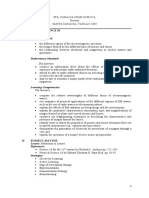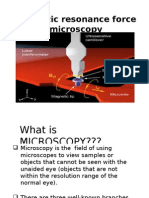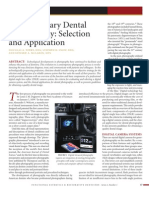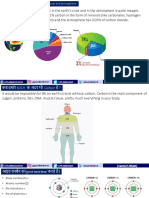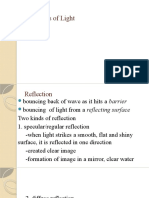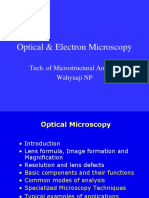Reflection of Light Experiment
Reflection of Light Experiment
Uploaded by
grace_lo_1Copyright:
Available Formats
Reflection of Light Experiment
Reflection of Light Experiment
Uploaded by
grace_lo_1Original Description:
Copyright
Available Formats
Share this document
Did you find this document useful?
Is this content inappropriate?
Copyright:
Available Formats
Reflection of Light Experiment
Reflection of Light Experiment
Uploaded by
grace_lo_1Copyright:
Available Formats
EXPERIMENT 5.
1 REFLECTION OF LIGHT
AIM: To observe and record how plane and curved mirrors reflect light beams.
EXPERIMENT 1: PLANE MIRROR
Lay a piece of white paper on the bottom of the optical table, using the screen or card to make sure the laser path goes across
the middle of the sheet. Position the mirror on the sheet so that it makes an angle with the light beam, as shown in figure
below. Record your data in the provided table.
Angle of incidence, Angle of reflection, Mirror
i
r
Normal
EXPERIMENT 2: CONCAVE MIRRORS
(a)Position the light box at the edge of this paper and turn it on. Place the triple-ray-forming plate into the slot and adjust the
box to ensure that the three rays emitted are parallel.
Place the concave mirror about 10cm from the front of the light box and align it so that the central ray reflects back on itself.
Trace the incident and reflected rays and note where they meet. This spot is called the FOCAL POINT of the mirror. Draw the
reflected light ray, mark and label the focal point.
RAY DIAGRAM:
(b) How far is the Focal Point from the mirror?______________________________________ (This distance is called the FOCAL LENGTH
of the mirror.)
KBAT: Why do satellite dishes use concave reflectors?
__________________________________________________________________________________
EXPERIMENT 3: CONVEX MIRRORS
(a) Position the light box on the edge of this paper and turn it on. Place the triple-ray-forming plate into the slot. Place the
convex mirror (the concave mirror in reverse) about 10cm from the front of the light box and align it so that the central
ray reflects back on itself. Trace the incident and reflected rays.
RAY DIAGRAM:
(b) Once you have drawn the rays, trace the reflected light rays (which should all be spreading out) back behind the mirror.
Use dotted lines. They should all meet at the same spot, which is called the virtual focus. Mark in the virtual focus.
How far is the Virtual Focal Point from the mirror (the Focal Length)? _________________________
Question:
1. Is the Law of Reflection obeyed?
2. Compare your results from the flat mirror and the curved mirror. Which set of results obeys the Law of Reflection
most closely?
You might also like
- MASTERING - Digital Dental Photography PDFDocument396 pagesMASTERING - Digital Dental Photography PDFEduard Butuza100% (5)
- Microscope Lab Key 1Document6 pagesMicroscope Lab Key 1cellestial_knightNo ratings yet
- 6.4 Thin Lens Formula Worksheet NameDocument5 pages6.4 Thin Lens Formula Worksheet Namegrace_lo_1No ratings yet
- Grade 10 - Lab ManualDocument10 pagesGrade 10 - Lab ManualMoghanNo ratings yet
- Experiment 9 Mirrors and LensesDocument5 pagesExperiment 9 Mirrors and LensesCely Marie VillarazaNo ratings yet
- Class-10 Lab ManualDocument9 pagesClass-10 Lab ManualIvan Jose100% (2)
- Reflection and Refraction of Light LabDocument2 pagesReflection and Refraction of Light Labfpvks4848xNo ratings yet
- Optics Kit User ManualDocument34 pagesOptics Kit User ManualVivek NagrajNo ratings yet
- Class X PracticalsDocument26 pagesClass X PracticalsNakul Riddish ANo ratings yet
- Lab 36Document5 pagesLab 36Jabran Ul-Haque100% (1)
- Aberration of A Lens - 1Document8 pagesAberration of A Lens - 1ANDREYY GORYACHEVNo ratings yet
- Vs203b - Lab7 Optical AberrationsDocument7 pagesVs203b - Lab7 Optical AberrationsANDREYY GORYACHEVNo ratings yet
- Class X PracticalsDocument14 pagesClass X PracticalsGopika RanaNo ratings yet
- Experiments Term 1class Xlight Reflection and RefractionDocument4 pagesExperiments Term 1class Xlight Reflection and Refractionayushiguptab0406No ratings yet
- SL-00169S For W-SMS-WAV08-09-10Document18 pagesSL-00169S For W-SMS-WAV08-09-10wajeeh71mNo ratings yet
- ReflectionDocument3 pagesReflectionRavin BoodhanNo ratings yet
- Exercise 2 Microscopy Part III (Viewing)Document9 pagesExercise 2 Microscopy Part III (Viewing)Cresostomo NogasNo ratings yet
- 8th 2023-III-LAB3 Using A MicroscopeDocument5 pages8th 2023-III-LAB3 Using A MicroscopeFelipe MNo ratings yet
- Using The Microscope LabDocument3 pagesUsing The Microscope LabCamille GayleNo ratings yet
- G10PHYEXP12Document10 pagesG10PHYEXP12ROCKER QNo ratings yet
- Exploring Science 7ac - MicroscopesDocument1 pageExploring Science 7ac - MicroscopesPatrícia BarrosNo ratings yet
- NAEST 2022 Prelims EXPERIMENT-3Document3 pagesNAEST 2022 Prelims EXPERIMENT-3Prapanj KtNo ratings yet
- Exercise No 1 Microscopy 1Document5 pagesExercise No 1 Microscopy 1Diana BoladoNo ratings yet
- JWST Model 1-48scale Final-InstructionsDocument9 pagesJWST Model 1-48scale Final-InstructionsAlexander Nuñez CastilloNo ratings yet
- PDF Document (7)Document4 pagesPDF Document (7)Keshav NamdeoNo ratings yet
- 2 y DFSMia Fqu Ym 7 ZZW 3 L KDocument4 pages2 y DFSMia Fqu Ym 7 ZZW 3 L KHarsha MohanNo ratings yet
- 7TH Week LensesDocument7 pages7TH Week LensesMira VeranoNo ratings yet
- Grade 10 Quarter 2, Week 6: Title CardDocument30 pagesGrade 10 Quarter 2, Week 6: Title CardJeboy LaquianNo ratings yet
- Exercise No 1 Micros PDFDocument4 pagesExercise No 1 Micros PDFAlthea ValenzuelaNo ratings yet
- 9 RayopticsDocument8 pages9 RayopticsViredra Vikash C MNo ratings yet
- Exercise No 1 MicrosDocument4 pagesExercise No 1 MicrosAshley PapaNo ratings yet
- Reflection From A Plane MirrorDocument6 pagesReflection From A Plane MirrorHamidNo ratings yet
- EXPERIMENTSDocument17 pagesEXPERIMENTSbiswajitttt8No ratings yet
- Diffraction Grating Ver 1Document6 pagesDiffraction Grating Ver 1nupekadNo ratings yet
- Shedding Light On Reflection The Law of Reflection Liacos Educational MediaDocument2 pagesShedding Light On Reflection The Law of Reflection Liacos Educational Mediaapi-428484559No ratings yet
- Light Box With AccessoriesDocument20 pagesLight Box With AccessoriesScience HouseNo ratings yet
- Microscope Skills Activity (F)Document4 pagesMicroscope Skills Activity (F)Mark Vincent BuenoNo ratings yet
- Bio101 Lab Activity 03 - The MicroscopeDocument6 pagesBio101 Lab Activity 03 - The MicroscopeMARK JOEY FILAMONo ratings yet
- File Work I Term (G-10)Document8 pagesFile Work I Term (G-10)Rhea PillaiNo ratings yet
- PhysicsDocument3 pagesPhysicstejasvigNo ratings yet
- Grade X Physics Lab Manual 2022Document18 pagesGrade X Physics Lab Manual 2022buttrnaanNo ratings yet
- Bio101 Lab Activity 03 - The MicroscopeDocument6 pagesBio101 Lab Activity 03 - The MicroscopeFat PatNo ratings yet
- Experiment 1 - MicrosDocument5 pagesExperiment 1 - MicrosMa Juryst Chelsea Albay ArmasNo ratings yet
- X Light ExperimentsDocument16 pagesX Light Experimentsamlanjyotihazarika93No ratings yet
- optics BasicsDocument23 pagesoptics BasicsArivarasan iceNo ratings yet
- Optical Design Lab2Document7 pagesOptical Design Lab2ANDREYY GORYACHEVNo ratings yet
- Term 2 Physics Practicalsexperiments and ActivitiesDocument21 pagesTerm 2 Physics Practicalsexperiments and ActivitiesalvieNo ratings yet
- Lab 3Document15 pagesLab 3aizen3881No ratings yet
- PHYSICS Lab Manual t1 - 30Document52 pagesPHYSICS Lab Manual t1 - 302102100542No ratings yet
- Science Lab Manual Merged 1712032675Document43 pagesScience Lab Manual Merged 1712032675yuvrajchopra178No ratings yet
- Setting Up A Microscope For Use Putting Away A MicroscopeDocument4 pagesSetting Up A Microscope For Use Putting Away A MicroscopeNia MelladoNo ratings yet
- Exercise No 1 MicrosDocument5 pagesExercise No 1 MicrosJm Gutierrez0% (1)
- Physics Practical Expt2-5Document9 pagesPhysics Practical Expt2-5Kolluri SrinivasNo ratings yet
- Lab-1 MicrosDocument4 pagesLab-1 MicrosCherryNo ratings yet
- Laboratory Activity 1 MicrosDocument4 pagesLaboratory Activity 1 Microscharles mepania0% (1)
- practical of ch lightDocument6 pagespractical of ch lightnaibedyarath123No ratings yet
- Optics: Spherical Aberration in Lens ImagingDocument2 pagesOptics: Spherical Aberration in Lens ImagingHitesh KashyapNo ratings yet
- Microscope and Basic Plant Microtechnique Activity 2 WorksheetDocument9 pagesMicroscope and Basic Plant Microtechnique Activity 2 WorksheetEPHRAIM JOASH ABEJO GAGANTINGNo ratings yet
- Microscope Skills ReviewDocument5 pagesMicroscope Skills Reviewapi-329085879No ratings yet
- Microscope Lab Key 1Document6 pagesMicroscope Lab Key 1cellestial_knight100% (1)
- A2 Physics Astrophysics Lesson 1 Refracting TelescopesDocument102 pagesA2 Physics Astrophysics Lesson 1 Refracting Telescopesa singhNo ratings yet
- Optics and Optical Instruments: An IntroductionFrom EverandOptics and Optical Instruments: An IntroductionRating: 4 out of 5 stars4/5 (5)
- Physics B: Oxford Cambridge and RSA ExaminationsDocument21 pagesPhysics B: Oxford Cambridge and RSA Examinationsgrace_lo_1No ratings yet
- 08 Ithink JawapanDocument50 pages08 Ithink Jawapangrace_lo_1No ratings yet
- Form 3 Module Chapter 4 Reativity of MetalsDocument11 pagesForm 3 Module Chapter 4 Reativity of Metalsgrace_lo_1100% (1)
- Based On The Given Situation, The: SMK Methodist, Sibu Form 4 Peka ExperimentDocument2 pagesBased On The Given Situation, The: SMK Methodist, Sibu Form 4 Peka Experimentgrace_lo_1No ratings yet
- SMK Methodist Sibu Penataran Amali Sains (Biologi) Tingkatan 4 Sains Tulen 2018 Tarikh: 13 September 2018 (Khamis)Document1 pageSMK Methodist Sibu Penataran Amali Sains (Biologi) Tingkatan 4 Sains Tulen 2018 Tarikh: 13 September 2018 (Khamis)grace_lo_1No ratings yet
- Motion Ws BDocument11 pagesMotion Ws Bgrace_lo_1No ratings yet
- Levers Rev3Document20 pagesLevers Rev3grace_lo_1No ratings yet
- Motion Ws BDocument2 pagesMotion Ws BshamjaggernauthNo ratings yet
- Science & Maths Quiz 2019: District Level Challenge: Multiple-Choice Questions (MCQS) Answer SheetDocument1 pageScience & Maths Quiz 2019: District Level Challenge: Multiple-Choice Questions (MCQS) Answer Sheetgrace_lo_1No ratings yet
- (A) Fill in The Boxes Below With The Correct Products and Enzymes To Represent The Digestion of The Following SubstancesDocument1 page(A) Fill in The Boxes Below With The Correct Products and Enzymes To Represent The Digestion of The Following Substancesgrace_lo_1No ratings yet
- FSMQ Force Diagrams PDFDocument6 pagesFSMQ Force Diagrams PDFgrace_lo_1No ratings yet
- KrovvidyAPPhysicsCSummerWork Motion TestDocument13 pagesKrovvidyAPPhysicsCSummerWork Motion Testgrace_lo_1No ratings yet
- ScabDocument53 pagesScabgrace_lo_1No ratings yet
- Letter of Consent: ST STDocument1 pageLetter of Consent: ST STgrace_lo_1No ratings yet
- Shophouses Progress: Sublot 1 To 12Document2 pagesShophouses Progress: Sublot 1 To 12grace_lo_1No ratings yet
- PHENomenon of SoundDocument2 pagesPHENomenon of Soundgrace_lo_1No ratings yet
- Forces in Fluids Sample TestDocument13 pagesForces in Fluids Sample Testgrace_lo_1No ratings yet
- DC GeneratorDocument11 pagesDC Generatorgrace_lo_1No ratings yet
- Physics (Pink) P1Document21 pagesPhysics (Pink) P1grace_lo_1No ratings yet
- Scheme Answer Form 4 2017Document3 pagesScheme Answer Form 4 2017grace_lo_1No ratings yet
- Tajuk Ting Konstruk: R S IngatDocument3 pagesTajuk Ting Konstruk: R S Ingatgrace_lo_1No ratings yet
- Creativity in The ClassroomDocument5 pagesCreativity in The Classroomgrace_lo_1No ratings yet
- GCSE Worksheet For Drawing Dot and Cross Diagrams For Ionic BondingDocument1 pageGCSE Worksheet For Drawing Dot and Cross Diagrams For Ionic Bondingronghui009No ratings yet
- Atomic Structure Vs Crystal StructureDocument3 pagesAtomic Structure Vs Crystal StructureAin FarhanNo ratings yet
- Magnetic Resonance Force MicrosDocument14 pagesMagnetic Resonance Force MicrosPuneet M. SinghNo ratings yet
- Nonlinear Fiber Optics: Fourth EditionDocument16 pagesNonlinear Fiber Optics: Fourth EditionLeonard NsahNo ratings yet
- Sigma and Pi BondingDocument23 pagesSigma and Pi BondingBerlian SitorusNo ratings yet
- DirectColorMarkingFinalReport PDFDocument67 pagesDirectColorMarkingFinalReport PDFmaito2270No ratings yet
- Chemistry 481 (01) Spring 2014: Instructor: Dr. Upali SiriwardaneDocument48 pagesChemistry 481 (01) Spring 2014: Instructor: Dr. Upali SiriwardaneRidho Arief Al RasyidNo ratings yet
- Terry Mclaren Article Digital PhotoDocument10 pagesTerry Mclaren Article Digital PhotoFaheemuddin MuhammadNo ratings yet
- Hemistry Tructure of TOM: Evel Bjective Type QuestionsDocument7 pagesHemistry Tructure of TOM: Evel Bjective Type QuestionsCHITRANSH AGRAWALNo ratings yet
- SpectrophotometryDocument70 pagesSpectrophotometryaugusteNo ratings yet
- Hasselblad Avoiding FlareDocument3 pagesHasselblad Avoiding FlareDavion Shawney ForbesNo ratings yet
- File 2Document16 pagesFile 2ashok kumarNo ratings yet
- USP-NF 776 Optical MicrosDocument6 pagesUSP-NF 776 Optical Microskarenruiz1102No ratings yet
- 2019-MS-Ceta-S Camera-DS0323-EN-11-2019-76326-PRINTDocument2 pages2019-MS-Ceta-S Camera-DS0323-EN-11-2019-76326-PRINTMichele GiannattasioNo ratings yet
- Optical Fiber 2022Document12 pagesOptical Fiber 2022Nidhi R VassNo ratings yet
- Wave Optics NumericalDocument2 pagesWave Optics NumericalABHAY SINGH OFFICIALNo ratings yet
- Flim1000 Test ReviewDocument4 pagesFlim1000 Test ReviewSebastian VidretNo ratings yet
- Carbon and Its Compounds One Shot GYAANI KEEDA PDFDocument34 pagesCarbon and Its Compounds One Shot GYAANI KEEDA PDFFakeNo ratings yet
- Lesson 4.1 Properties of Light 2022Document23 pagesLesson 4.1 Properties of Light 2022Dainiel G. PerezNo ratings yet
- 8fa Dalton's Atomic ModelDocument21 pages8fa Dalton's Atomic Modeldr.nahlafarouk25No ratings yet
- 09 10 McGrawHill Test Bank in CHEMISTRYDocument17 pages09 10 McGrawHill Test Bank in CHEMISTRYAndrei Ainsley DolorosaNo ratings yet
- Optical FlatsDocument3 pagesOptical FlatsnvemanNo ratings yet
- Raman and FTIR Spectroscopies of Fluorescein in Solutions: Lili Wang, A. Roitberg, C. Meuse, A.K. GaigalasDocument11 pagesRaman and FTIR Spectroscopies of Fluorescein in Solutions: Lili Wang, A. Roitberg, C. Meuse, A.K. GaigalasREALVentorNo ratings yet
- Om SemDocument89 pagesOm SemRezki AshidiqiNo ratings yet
- Lesson 5 Bohr Model of HydrogenDocument18 pagesLesson 5 Bohr Model of HydrogenhendrixignacioNo ratings yet
- Optical Fiber Communication Tutorials SeniorDocument7 pagesOptical Fiber Communication Tutorials Seniorarpana07090% (1)
- Ultrafast Transient Absorption Spectroscopy: A Practical Introduction A Practical IntroductionDocument16 pagesUltrafast Transient Absorption Spectroscopy: A Practical Introduction A Practical IntroductionTracy ChanNo ratings yet
- PDF DocumentDocument14 pagesPDF DocumentmaxNo ratings yet
- Matric Std10 5 ChemistryDocument189 pagesMatric Std10 5 ChemistryDheena ThayalanNo ratings yet


























